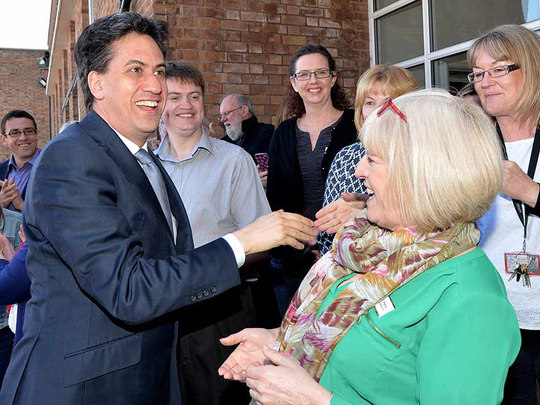
Dubai: With the start of formal campaigning, the parties released their manifestos and both David Cameron and Ed Miliband focused on the economy.
After years of austerity, it was strange to find a Conservative offering giveaways as Cameron made a direct appeal to people’s avarice by offering 1.3 million housing association tenants the right to buy their homes, and raising the lower limit of death duties to £1 million (Dh5.5 million). It was equally strange to find Miliband sounding a lot more conservative than the Conservatives as he sought to prove that Labour would not wreck the recovery with crazy socialist spending.
Both Conservatives and Labour made a serious pitch to attract British Asian votes, as they recognised that the national debate over immigration has an unfortunate resonance with former immigrant families. Under pressure from the racist Ukip, both major parties have railed against allowing any more immigrants into Britain, but both are very anxious to show that they want to be in tune with Britain’s minorities.
To this end, Cameron made a well publicised visit to a Sikh gurdwara in Kent to join the festivities for the spring festival of Vaisakhi. He had a shrewd eye on the 420,000 British Sihks who are thought to be active voters and have traditionally have supported Labour, though the Conservatives hope that they may switch this time.
Miliband also joined in when he told an Asian audience that the previous Labour government had made a mistake by failing to seek maximum numbers allowed into Britain when new Eastern European countries joined the European Union in 2004.
Then he spoke to a wider audience when he set out four principles to help tackle the issue: “Securing borders; restoring the principle that you contribute before you claim; achieving integration in our communities; and ending the undercutting of wages of local workers through the exploitation of migrant workers,” and he added a fifth more obvious principle of “rebuilding trust by only making promises we can keep”.
Palestine Ed
Miliband has been struggling with his relationship with Britain’s Jewish community, which has traditionally been pro-Labour although it enjoyed a brief flirtation with Thatcher’s Conservatives. The Spectator magazine published an interesting article showing how Miliband’s ethnic Jewishness was largely lost by his left wing political parents who defined themselves by their politics, not by their religion.
It reported that when Miliband became Labour leader he had no relationship with the British Jewish community, and the tentative openings he made were quickly soured by his vigorous and unrepentant support for the people of Gaza and the Palestinians under Israeli attack. This dislike was further confirmed last October when Miliband insisted that Labour MPs vote in support of a motion backing unilateral recognition of a Palestinian state — proposed by a Labour backbencher who the month before had compared the Israeli army to Daesh.
Therefore many British Jews are stunned this election, finding that they cannot vote for a pro-Palestinian Labour leader. Some Jewish Labour activists believe the party has written the community off electorally and the Spectator points out that this could turn out to be a costly miscalculation in a string of more than 10 marginal Labour seats in north London like Finchley, Golders Green, and Hampstead, where Jewish voters could provide the difference between victory and defeat.












